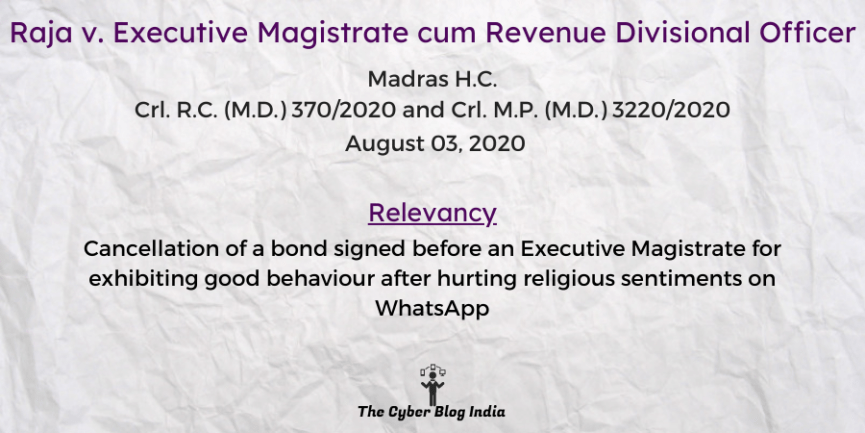Raja v. Executive Magistrate cum Revenue Divisional Officer

Raja v. Executive Magistrate cum Revenue Divisional Officer
In the High Court of Madras
Crl. R.C. (M.D.) 370/2020 and Crl. M.P. (M.D.) 3220/2020
Before Justice RMT Teekaa Raman
Decided on August 03, 2020
Relevancy of the Case: Cancellation of a bond signed before an Executive Magistrate for exhibiting good behaviour after hurting religious sentiments on WhatsApp
Statutes and Provisions Involved
- The Information Technology Act, 2000 (Section 67)
- The Scheduled Castes and the Scheduled Tribes (Prevention of Atrocities) Act, 1989 (Section 3(1)(s))
- The Code of Criminal Procedure, 1973 (Section 110, 117, 122)
- The Indian Penal Code, 1860 (Section 294(b), 504, 505, 505(2))
Relevant Facts of the Case
- The police (respondent number two) registered a case against the petitioner under Sections 504 and 505 of the Indian Penal Code, 1860, and Section 3(1)(s) of the SC/ST Act, 1989, on October 05, 2017. This case is pending trial before the concerned Sessions Court.
- On October 14, 2019, the police took the petitioner to the first responder’s office for initiating proceedings under Section 110 of the Code of Criminal Procedure, 1973. The police forced him to execute a bond for good behaviour for one year.
- On March 21, 2020, the police registered another case against the petitioner under Sections 292 and 505 of the Indian Penal Code, 1860, and Section 67 of the Information Technology Act, 2000. The complainant in this case, Navsath Alikhan, alleged that the petitioner defamed the Muslim community on WhatsApp.
- The police arrested the petitioner the same day, and the jurisdictional Court remanded him to judicial custody. The Court later granted him bail on March 30, 2020.
- On March 23, 2020, the police forwarded a report to the first respondent. This report stated that the petitioner has violated the bond for good behaviour. The first respondent issued a summon for appearance. The petitioner appeared on the given date. Subsequently, it was held that the petitioner had violated his bond for good behaviour.
Prominent Arguments by the Advocates
- The public prosecutor submitted records showing that the petitioner is a habitual offender and history sheeter.
- The petitioner’s counsel argued that the order passed by the Executive Magistrate was without jurisdiction.
Opinion of the Bench
- The court held that the accused had been given sufficient opportunity to cross-examine the prosecution witnesses in the proceedings challenged.
- In the order, there was a clear discussion on the reasoning behind the decision.
- Hence, there is no merit in the petitioner’s arguments.
Final Decision
- The court dismissed the criminal revision petition.
Mehula Liza Pallathu, an undergraduate student at the National University of Advanced Legal Studies, Kochi, prepared this case summary during her internship with The Cyber Blog India in May/June 2021.
